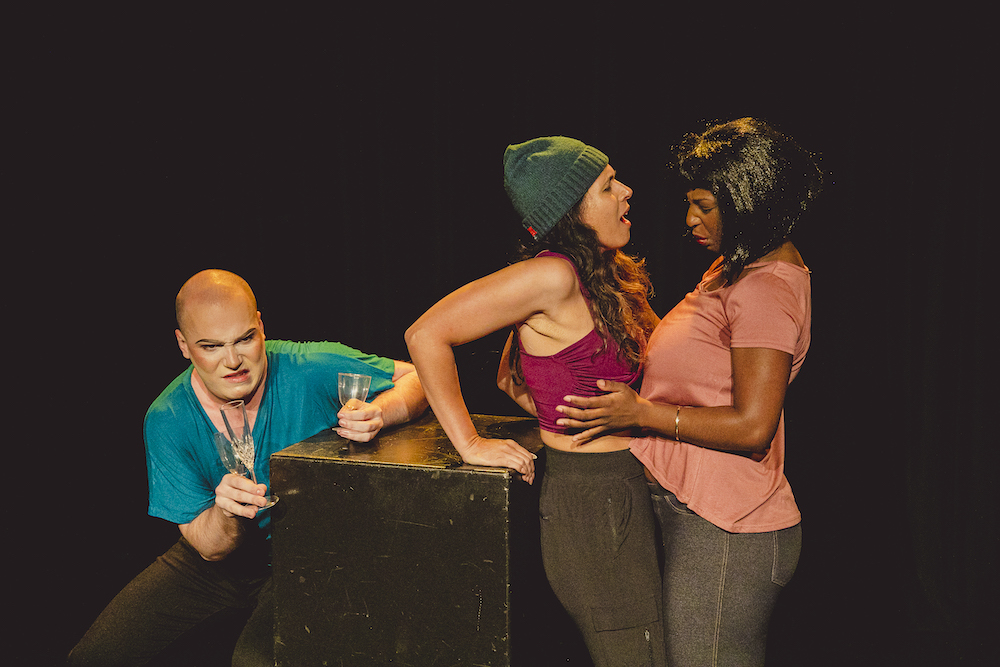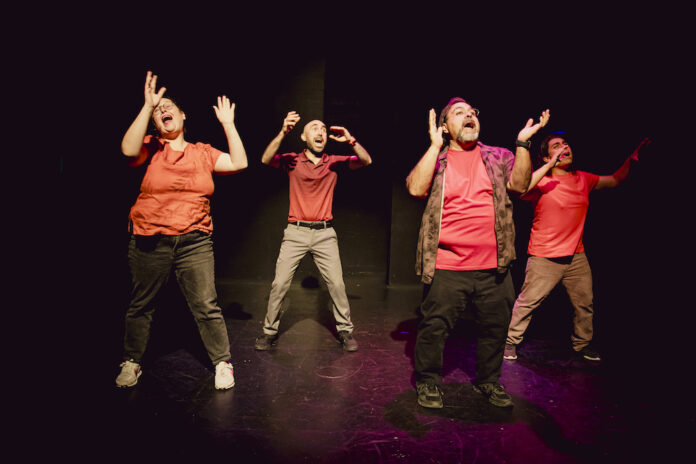Compared to most Bay Area theatre companies, Killing My Lobster were actually doing well in 2025. Despite other companies cutting back or shutting down in the wake of DOGE-mandated cuts to the arts and DEI programs, this quarter-century-old SF sketch troupe actually seemed to be in good shape, thanks to some 2024 restructuring.
Sure, they weren’t producing one-show-a-month anymore, but everything else looked good: The shows they were doing all had great crowds; the quick-turnaround experiment Sketch on Speed (in which scripts are written in hours and only given to performers the night of the show) quickly gained a following; and their various acting and writing classes attracted plenty of students.
“We had reasons to be optimistic,” KML Artistic Director Nicole Odell tells me. “Our class sales had been more robust than previous years, with our class slots almost selling out in the first six months of 2025, and we had actually added two class sessions in the second half of the year. Our Sketch on Speed series had completely sold out all four out of the four performances we’d held so far, and BAD Lobster had met our ticketing goals. It felt as though we were slowly-but-surely turning the ship around.”
Unfortunately, that positive reception was tempered by a sudden dearth regular funding sources—particularly, the NEA. Like their peers, KML suddenly found themselves denied crucial grants from many of their regular foundations, both local and federal. Although they held out hope for a last-minute grant from the Performing Arts Equitable Payroll Fund (PAEPF), they learned on August 6 that it wasn’t going to happen.
Odell and KML board members spent the next week carefully planning their announcement about the suspension of operations by year’s end. They sent out an official e-mail to company members on Tuesday, August 12. By sheer coincidence, this was three weeks after a similar announcement by landmark queer club Oasis and one day after Berkeley’s lauded Aurora Theatre did the same.

“We had to plan our communications with the community carefully, being mindful of timing around a rehearsal process currently running, and notifying artists who were immediately impacted ahead of the larger announcement,” says Odell. “That it came so close on the heels of the announcement from Aurora Theatre Company was a heartbreaking coincidence, and we send love to any and all theatre-makers who have been in this distressing position.”
The rehearsal process in question is for Legends & Laughter, KML’s upcoming Dungeons & Dragons-inspired comedy show, opening August 29 at Eclectic Box. As of this writing, that show’s scheduled three-weekend run will be the company’s last proper production. It’s not the way anyone imagined the end of the nearly-three-decade-old company.
Founded in 1997 by five Brown University grads, Killing My Lobster—whose non-sequitur moniker resulted from a drunken word game among the founders—played their first show in SF’s Mission that Valentine’s Day. They’d spend the next two decades distinguishing themselves amongst a growing field of local competitors by their ability to cultivate big laughs and strong talent both on and off-stage.
Each monthly show revolved around a single theme (therapy, friendship, or the works of Alfred Hitchcock) and typically began with a raffle, with prizes going to the answers written at the bottom of pre-show surveys: A question as innocuous as “How do you deal with stress?” often yielded the most hilarious audience answers. After a theme-related opening riff on a well-known pop song came, there’d be the back-and-forth between the night’s live performance sketches and hilarious short films, before closing with another pop music spoof.
Yet, as beloved as KML was, the company (whose founders have long-since moved on) had a reputation for being a ship with no captain. By 2014, the lack of any clear direction saw much of its talent pool break away to form their own short-lived troupes.
That same year, KML regulars Allison Page and Millie Brooks stepped up as the company’s co-creative directors before eventually taking on the respective roles of artistic and executive directors. Under their guidance, KML not only attracted more talent and larger audiences (both of which became noticeably more ethnic- and gender-diverse), they expanded their focus into the aforementioned classes, corporate team-building programs, and a number of scholarships. They notably partnered with Mission non-profit 826 Valencia for the youth-class program KML + 826.
Brooks left the company and San Francisco in the late-2010s, leaving Page to run things herself when COVID hit in 2020. When Page announced her own departure for Nashville in 2021, a months-long search for successors ended with Odell and Emma McCool taking the reins as artistic and executive director, respectively.

Like Page before her, Odell was a KML regular before taking the AD title. Under she and McCool’s tenure, KML pledged a greater commitment to diversity, with their performance programs boasting casts and writers’ rooms far removed from the cis-het white male norms (even in San Francisco). Still, the duo’s incoming situation was almost an inverse of their predecessor’s: The company was in good shape, but the COVID-ravaged economy wasn’t.
“Allison designed a thoughtful, supportive transition, which left us with so many amazing tools and institutional knowledge; she understands better than anyone how many hats we have to wear with such a small team, and she really took care of us before she left,” Odell explains. “I think the challenges we’ve faced after her departure have been unprecedented—not just for us, but for any theatre company—and have been compounded by the larger difficulties around sustaining live theatre in San Francisco’s current landscape.”
Although things appeared to be “business as usual” for 2022 and ’23, the company noticeably cut back on proper shows in 2024, only producing them every few months. Not helping matters was having to find new regular venue, after former homes PianoFight and EXIT Theatre both vanished. They finally landed at Eclectic Box (formerly Stage Werx) just before the scale-back plans went into effect.
The suspension announcements by KML, Oasis, and Aurora emphasize how what was once anomalous is now a regular occurrence. Odell cites “the pandemic, the cost of living, AB-5*, and now the challenges with foundations” as having turned the sustainable creation and showcase of local arts into an uphill battle. (Earlier this year, McCool resigned from her role to cut costs.) Even the renowned Magic Theatre, training ground for luminaries like Sam Shepard and Colman Domingo, had to cancel its world premiere Jerry Garcia musical due to sudden lack of funding.
Still, SF State grad Odell easily refutes any narratives of the Bay as bereft of creativity.
“I’m seeing some good signs,” she says. “I’m part of the adjunct professor pool at Skyline College in San Bruno, and I’ve watched promising new talent come out of local high schools, move through the Skyline theatre program, and transfer to SF State in just a couple of years. The KML audiences seemed to be slowly returning. There is a desire for the work, and the seeds to rebuild are there.”

How to rebuild is crystal-clear. In a city where the rich scion mayor glad-hands oligarchs to fund a militarized police force, Odell suggests diverting funds towards diverse, low-income entities as what’s desperately needed for a cultural scene in crisis.
“I love this city so much, and I believe in the scene here,” she insists. “So many dedicated people are working extremely hard to turn it around. But we need systemic change, and a more hospitable environment for us to regrow. Powerful entities need to invest some of the immense wealth that exists in this city back into the arts.”
As Odell hopes to keep the company’s classes active and hold onto their Folsom St. headquarters, she and her colleagues hope to move ahead with the troupe’s annual 14-hour Giving Tuesday marathon, which regularly exceeds it donation goals. She also hopes to do more acting of her own, having appeared last year on Shotgun’s stage.
As this chapter of KML comes to an apparent close, the hardest part for her is picking just one highlight.
“I love seeing a comedian who is new to our pools work on a show for the first time, and then continue to engage with us in other capacities beyond the end of that project,” she reveals. “It tells me that they felt welcomed and supported; that what has been built here, and what we continue to build, is something they found value in. The fact that people continue to want to be around us says that KML is a resource for them, rather than a drain. That feels important to me.”
*California legislature bill AB-5 was meant to support gig economy workers from exploitation by corporations like Uber that refused to classify the workers as “employees.” Since its implementation, the bill has made it difficult for traditionally-short-term occupations like theatre to retain talent. A common work-around is for theaters to classify performers as simply paid “volunteers”.






